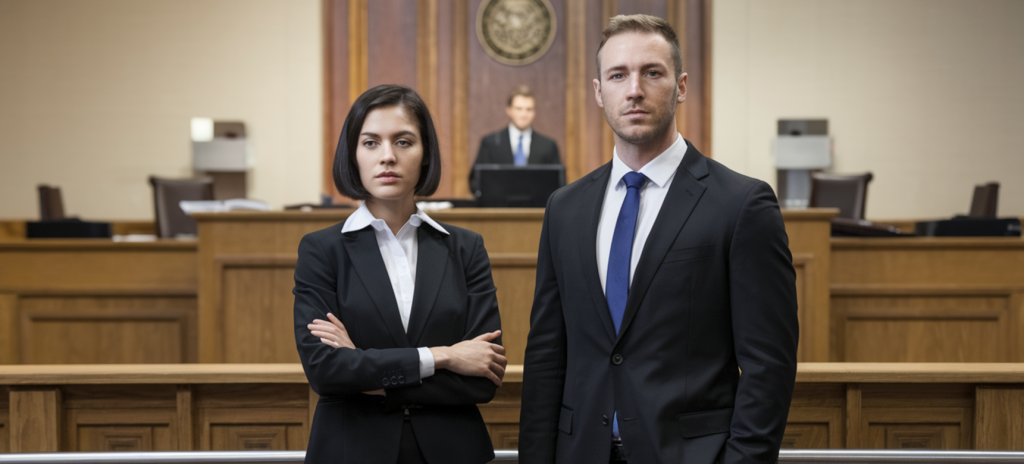10 Most Searched Questions Related to Criminal Law on Google (and answers)
The criminal justice system is confusing and frightening. If someone is facing felony or misdemeanor prosecution, they likely have questions and few answers.

Top Ten Most-Search Criminal Law Questions
1. What is criminal law?
Criminal law is a branch of law that deals with punishing individuals who have committed crimes. Criminal law defines:
- the actions are considered illegal,
- establishes punishments for those actions, and
- governs the procedures for investigating, prosecuting, and punishing individuals accused of crimes.
Criminal law protects society by deterring criminal behavior, rehabilitating offenders, and ensuring justice is served. It is a complex area of law that encompasses a wide range of offenses, from minor misdemeanors to serious felonies. Local, state, and federal agencies, such as the Michigan State Police, the FBI, the DEA, and local police departments, enforce the law.
2. What is the purpose of criminal law?
The purpose of criminal law is to protect society by deterring criminal behavior, rehabilitating offenders, and ensuring that justice is served. In reality, law enforcement often mistreats defendants, and judges are too weak to protect their rights. Strong, fearless defense lawyers are a key element in ensuring the system works fairly. Criminal law serves several vital functions:
- Deterrence: Criminal law serves as a deterrent to criminal behavior by setting forth the punishments for crimes and warning potential offenders about the consequences of their actions.
- Rehabilitation: Criminal law aims to reform and rehabilitate offenders, helping them reintegrate into society and become productive community members.
- Retribution: Criminal law serves as a form of punishment for those who have committed crimes, holding them accountable for their actions and punishing them proportionally to the harm they have caused.
- Protecting society: Criminal law helps to protect society by removing dangerous individuals from the community and preventing them from committing further crimes.
Overall, criminal law aims to promote a safe and just society by deterring criminal behavior, rehabilitating offenders, and ensuring that justice is served.
3. What is the difference between criminal and civil law?
Criminal and civil law are two distinct areas of law that serve different purposes and procedures.
Criminal law involves the government prosecuting individuals or organizations for offenses considered harmful to society, such as assault, weapons crimes, white-collar crimes, and drug offenses. Criminal law focuses on punishing the offender and protecting the community, and the penalties for criminal violations can include fines, imprisonment, or both.
Civil law, on the other hand, involves disputes between individuals or organizations and focuses on compensating the victim and restoring them to their previous position. Civil law cases include disputes over contracts, property, personal injury, and other similar matters, and the remedies available in civil law cases include monetary damages, injunctions, and specific performance.
4. What is the definition of a crime?
A crime is an act or omission prohibited by criminal law and punishable by the government. To be considered a crime, an act must be prohibited by law and have resulted in harm to society or an individual. The definition of a crime varies depending on the jurisdiction. Still, it generally includes acts that are considered harmful to society as a whole, such as murder, theft, or drug offenses.
Crimes can be classified as either misdemeanors or felonies, depending on their seriousness. Misdemeanors are less serious crimes punishable by fines or short-term imprisonment. Felonies are more severe crimes punishable by longer prison sentences or even the death penalty in some jurisdictions.
In general, statutes define crimes. The definitions of crimes and their punishments can vary widely from jurisdiction to jurisdiction. However, certain acts, such as murder, theft, and assault, are considered crimes in most jurisdictions and carry similar penalties.
5. What are the elements of a crime?
Under Michigan criminal law, the elements of a crime are the factors that must be present for an act to be considered a crime. Prosecutors, judges, and juries use these elements to determine whether to charge a defendant with a crime, whether an individual is guilty, and what punishment they should receive if they are found guilty. The specific elements of a crime vary depending on the jurisdiction and the type of crime in question, but generally, the following elements are present in most crimes:
- Actus Reus: This refers to the physical act that constitutes the crime. For example, in the case of theft, the actus reus would be taking someone else’s property without their consent.
- Mens Rea: This refers to the accused’s mental state at the time of the alleged crime. For example, if the accused intended to steal someone else’s property, they would have the required mens rea for shoplifting or retail theft.
- Concurrence: Concurrence refers to the requirement that the actus reus and mens rea occur simultaneously. In other words, the act must be committed with the intent to commit the crime for an individual to be guilty.
- Causation: This refers to the requirement that the actus reus must be the direct result of the accused’s actions. In other words, the act must be the direct cause of the harm that constitutes the crime.
- Harm: This refers to the requirement that the act results in harm or injury to society or an individual. For example, in the case of theft, the harm is the loss of someone else’s property.
In summary, the elements of a crime are the physical act, the mental state of the accused, the requirement that the act and mental state occur at the same time, the requirement that the act must be the direct cause of the harm, and the harm that results from the act. These elements must be present for an action to be considered a crime.

6. What is the difference between a misdemeanor and a felony?
In criminal law, a misdemeanor and a felony are two different categories of crimes, with varying levels of severity and various punishments. The main difference between them is the seriousness of the offense and the length and severity of the sentence.
A misdemeanor is a less serious crime typically punished by fines or short-term imprisonment, usually less than one year. Examples of misdemeanors include minor assault, petty theft, disorderly conduct, and traffic violations.
A felony, on the other hand, is a more serious crime punishable by longer prison sentences, often more than one year. Examples of felonies include serious assault, OWI 3rd, theft, murder, and major drug offenses, such as delivery or manufacture crimes. In some cases, a person convicted of a felony may also face additional penalties, such as the loss of certain rights and privileges, such as the right to vote or possess firearms.
In general, the law determines the difference between misdemeanors and felonies by the severity of the crime and the length and severity of the punishment. Misdemeanors are less serious crimes with lighter sentences, while felonies are more serious crimes with more severe penalties.
7. What is the role of a criminal defense attorney?
A criminal defense attorney is a lawyer who specializes in representing individuals and organizations charged with criminal offenses. A criminal defense attorney’s role is to defend their clients against criminal charges and to protect their rights, interests, and freedoms throughout the criminal justice process.
The specific responsibilities of a criminal defense attorney can include the following:
- Advising clients on their rights and responsibilities under the law.
- Investigating the facts of the case and gathering evidence to build a defense.
- Negotiating with prosecutors to reach a plea bargain or to have charges reduced or dismissed.
- Representing clients in court, including arguing motions and making opening and closing statements.
- Cross-examining witnesses and presenting evidence on behalf of their clients.
- Advocating for their clients during sentencing and appeals, if necessary.
- Keeping their clients informed about the progress of their case and explaining their options and the possible outcomes.
A criminal defense attorney is an essential advocate for their clients, working to ensure that their rights are protected and that they receive a fair trial. Whether negotiating a plea bargain, presenting a defense in court, or representing their clients on appeal, a criminal defense attorney plays a critical role in the criminal justice process.
8. What is the punishment for a crime?
The penalty for a crime depends on the specific circumstances of the crime and where the defendant allegedly committed the crime. Generally, the punishment for a crime can include one or more of the following:
- Incarceration: Incarceration is the most severe punishment for a crime and involves a prison sentence. Imprisonment can range from a few days or weeks for minor offenses to many years or even a life sentence for serious crimes like murder, robbery, and auto theft.
- Fines: Fines are monetary punishments for crimes. The convicted person must pay a specified amount of money to the government as a penalty. The judge determines the amount of the fine based on the severity of the offense and the convicted person’s financial situation.
- Community service: Community service is a punishment where the convicted person must perform a specified number of hours of community service, such as working at a non-profit organization or cleaning up public spaces.
- Probation: Probation is a punishment where the convicted person is released into the community under the supervision of a probation officer and must adhere to certain conditions, such as reporting to the probation officer, avoiding further criminal activity, and meeting specific requirements like paying fines or participating in rehabilitation programs.
- Restitution: Restitution is where the convicted person must pay compensation to the victim or to the community to make up for the harm caused by the crime.
The specific punishment for a crime can vary depending on the jurisdiction and the case’s specifics. Some crimes may also have mandatory minimum sentences, which means that the convicted person must receive a minimum sentence, regardless of the circumstances of the case.
In summary, the punishment for a crime can include incarceration, fines, community service, probation, and restitution. The jurisdiction and the circumstances of the defendant and the case determine the specific punishment for a crime. A defendant’s best hope of avoiding jail or prison is having a criminal defense expert protect and defend them in court.
9. What are the rights of a criminal defendant?
Criminal defendants, like all individuals in the criminal justice system, have certain rights protected by the law, including the right to a good criminal defense attorney. These rights ensure that criminal defendants receive a fair trial and protect people from unreasonable searches, seizures, and other violations of their rights. The most important rights of a criminal defendant include the following:
- The right to a fair and impartial trial: The defendant has the right to a trial by a neutral and impartial jury, free from outside influence and bias.
- The right to an attorney: The defendant has the right to be represented by an attorney, either appointed by the court or retained by the defendant.
- The right to be informed of the charges: The defendant has the right to know what the government has charged them with and the evidence against them.
- The right to remain silent: The defendant has the right to remain silent and not incriminate themselves.
- The right to a speedy trial: The defendant has the right to a trial without undue delay.
- The right to confront witnesses: The defendant has the right to cross-examine witnesses who testify against them and to present witnesses and evidence in their defense.
- The right to appeal: The defendant can appeal a conviction to a higher court.
These are some of the fundamental rights of a criminal defendant, but there may be additional rights specific to the case’s jurisdiction and circumstances. It is essential for criminal defendants to understand their rights and to work with their attorneys to ensure that these rights are protected throughout the criminal justice process.
10. How does the criminal justice system work?
The criminal justice system in Michigan has three main branches: law enforcement, the courts, and corrections. Here is a general overview of how each branch operates in Michigan:
- Law Enforcement: Michigan’s law enforcement agencies investigate crimes and make arrests. The largest agency is the Michigan State Police, but there are also many local and county-level police departments.
- Courts: The Michigan court system has two primary levels: the district court and the circuit court. District courts handle most criminal cases, while circuit courts handle more serious crimes, appeals from district courts, and some civil cases. The Michigan Supreme Court is the state’s highest court and is responsible for hearing appeals from the circuit courts.
- Corrections: The Michigan Department of Corrections is responsible for supervising and managing offenders serving sentences in Michigan’s prisons. The department also oversees community supervision programs for offenders released from prison on parole.
In general, the criminal justice process in Michigan begins with an arrest by criminal law enforcement. After an arrest, the defendant is usually taken to a local jail for booking and then transferred to court for an arraignment. The defendant enters a plea at the arraignment, and the judge sets bail or determines if the defendant will be held in jail until their trial. Defendants have a right to bail, and a good defense lawyer can help a defendant seek release on a personal recognizance bond. If the defendant is convicted, the judge may sentence them to serve time in a Michigan prison, probation, or parole.
A felony or misdemeanor prosecution is scary. Anyone facing charges will likely have questions about their charges and the steps in a criminal prosecution. You are not alone, and we can help you!

Michigan Criminal Defense Attorneys
The Defense Team with LEWIS & DICKSTEIN, P.L.L.C. uses a unique team approach that frequently achieves outcomes unobtainable by less experienced or effective defense attorneys. When hired to defend felony or misdemeanor charges, our criminal law defense lawyers collaborate and coordinate to build the strongest possible defense or achieve the most lenient outcome, depending on our client’s goals and objectives. We will do everything possible to achieve the best possible result. Call us for a free consultation. We will take the time to talk with you, answer your questions, and work with you to develop a winning strategy!
Call us today at (248) 263-6800 for a free consultation or complete an online Request for Assistance Form. We will contact you promptly and find a way to help you.
We will find a way to help you.
We Are Not Afraid to Win!
10 Most Frequently Charged Crimes in Michigan
- Driving under the influence (DUI) or Operating While Intoxicated (OWI)
- Drug offenses (possession, manufacture, and distribution of controlled substances)
- Larceny and theft (including shoplifting and embezzlement)
- Assault and battery
- Domestic violence
- Burglary
- Fraud (including identity theft and credit card fraud)
- Weapons offenses (including carrying a concealed weapon without a permit)
- Reckless driving
- Prostitution and solicitation
It’s important to note that the frequency of these crimes may vary depending on several factors, such as the population, the location, and the time period considered. Additionally, the specific charges and penalties for crimes can vary depending on the circumstances and the jurisdiction.













